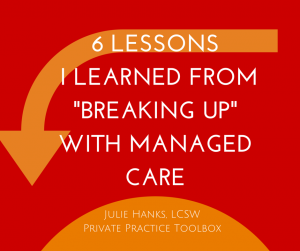About 8-9 years ago, I felt a pull toward gaining media and social media skills and expertise. At the time, I wasn't sure why...or how. In hindsight, I now see the clear benefits of my media visibility for my private practice and for me as a professional. I also had no idea how fun it would be to build relationships (with producers, journalists, reporters, TV hosts, etc.), educate my community, and share my message and expertise with thousands of people. This decision to become media-savvy has altered the course of my professional life in exciting and new ways. Because my practice has grown so much (3 locations, 20 employees) and requires more management, because I'm increasingly involved in media work and content creation, and because it felt like the right thing to do, I have retired from clinical work. I now focus on writing, private practice business consulting, earning my PhD, and spending time with my family. These opportunities would not have been possible had I not acquired social media skills.
Reflecting on my career (thus far), I want to share with you some tangible benefits of becoming proficient with (social) media and maintaining an online presence. Here are 10 things you can do by becoming a media-savvy therapist:
1) Educate Your Community; Educate The World
The mental health field is by nature a helping profession. We became therapists to help people who are struggling in some aspect of their lives, right? One of the biggest ways to do is this by educating individuals. No matter your area of expertise (marriage therapy, addiction, depression, etc.), you have valuable insight that you can share with your community to serve them and better their lives. By embracing media (TV, radio, print) and newer technologies (blogging, podcasts, social media), your message can be amplified exponentially, causing you to reach a greater audience.
2) Grow Your Practice (even during an economic downturn!)
I founded my private practice (Wasatch Family Therapy) in 2002 and consider myself an early adopter of technology. We created a website not long after we opened and have fully embraced and utilized social media as the years have gone by. To say that this has grown our practice is an understatement: maintaining a strong online presence has beenour number one strategy in acquiring new clients. What's more is that we now refer out over half of the individuals who seek our services (click here to read more about how our practice grew even in the economic downturn of 2008).
3) Increase Your Credibility Through Social Proof of Expertise
As you use your platform(s) of choice (blog, Facebook, Google+, etc.) to create content and build your body of work, you will in time gain followers who are interested in what you have to say. This will establish your social relevance and up your credibility. Others now view you as an expert and someone to be trusted. This can open up doors for you professionally, just like it has done for me! (read here about how gaining a social media following has brought me valuable career opportunities).
4) Employ a Fee-for-Service Model
Because I am familiar to more people, I have been able build a fee-for-service practice. This has led to increased income and has kept my clinicians from having to deal with the stress and burden of insurance companies. A private pay model also helps provide better quality therapy for clients. And once again, it's due in large part to our strong media presence that we were able to "break up with managed care."
5) Raise Visibility For Your Profession
We as therapists often lament the fact that mental health issues don't receive as much airtime as they deserve (though thankfully, this seems to be changing). Your media skills can help bring these topics to the forefront for your friends, family, and followers. For example, NASW has featured my work in their media news and even invited me to do national webinars. Good media interviews add visibility and educate the public about your profession in general and also about your specific expertise.
6) Create Additional Income Streams (book deals, paid blogging, consulting, etc.)
There is so much more to being in this field than seeing clients. My online presence has afforded me the opportunities to write for major websites and blogs, consult others about how to best build their practice, and even write a book (currently working on my second one)! By growing your media skills, you too can diversify your professional activities and create multiple streams of income for yourself.
7) Create Content For Your Blog
The information you access through your social media platforms can give you great inspiration for your blog. For example, when I do a TV interview, I then post it on my site, which improves SEO and provides new and engaging content. I've found that because of my technology connections, I never am lacking for material to blog or write about.
8) Reach MORE People With Your Message, Passion, & Expertise
The power that social media provides to reach others is truly unparalleled. I can now talk with hundreds or thousands of people at one time with each interview, not to mention the many more who will watch, listen, or read it online later. You can infinitely expand your outreach and get your message out there by utilizing media and social technologies.
9) Add Incentive for Additional Clinicians To Join Your Practice
My media presence and relationships have given other clinicians a reason to work for me instead of opening their own practice. So individuals who potentially may have been my competition are now on my team! Your media presence (blog, interviews, Facebook, etc.) can attract new therapists who know about your vision, values, and niche from what they've seen online.
10) Gain Recognition by Professional Organizations
My media appearances and online presence has garnered the attention of reputable organizations, and I'm grateful to have received some notable accolades. For example, I was named #1 online influencer for depression, and #2 mental health online influencer by ShareCare (a social media health company founded by Dr. Oz, Discovery Communications, and WebMD's Jeff Arnold), and received the 2015 National Association of Social Worker Award for my website JulieHanks.com.
How can YOU improve your media-savviness?
And what great opportunities await you as you do?
Join my upcoming media training. Click the graphic below to get on the list!
Visit the new PrivatePracticeToolbox.net for webinars and consulting services
FREE Download Get 52 Blog Post Topics & prompts when you sign up for PPT list
Join my Private Practice Toolbox Facebook group and connect with 3200 therapists around the globe in 2 simple steps: 1) Click request to join the group and 2) Fill out this brief questionnaire before you’ll be added to the group.








As healers, we genuinely like to do our work. Guiding clients through the therapy process and seeing them make progress is why we do what we do. But if you're in private practice, you know there's a lot going on in the back end and that it's crucial to run an efficient and organized business.